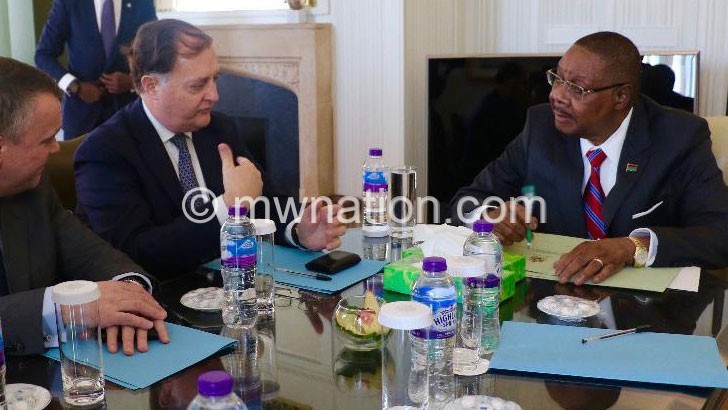Malawi investment mission under scrutiny
Trade and economic experts have faulted Malawi’s recent mission to the inaugural UK-Africa Investment Summit, saying the country’s failure to strike tangible deals could be attributed to poor preparation.
During the summit held last week, the UK government officially announced 27 deals worth £6.5 billion (about K6.3 trillion), but Malawi was conspicuously missing on the list of the participating 20 countries.
In separate interviews yesterday, economic and trade experts stressed that Malawi’s absence on the list of deals is a manifestation that investors are in a wait-and-see mode, before making concrete decisions to invest in the current political unstable Malawi.

While in UK, President Peter Mutharika is reported to have struck an energy deal with Private Infrastructure Development Group (PIDG) and a fertiliser plant deal with Innoselia Commercial Limited.
Speaking on arrival from the summit on Sunday, the President said the post-election political impasse is denting Malawi’s international image and appealed for peace.
He said: “The international community has expressed confidence in our macro-economic situation here. They say it is an economy where they can invest in power, agriculture, infrastructure, health and education.
But Betchani Tchereni, an economics lecturer at the University of Malawi’s The Polytechnic, yesterday said while the investment and macroeconomic environment may be good, the political impasse on one hand is taking its toll on the economy. He said this was detrimental to the country as an investment destination.
He said: “Our investment climate is not that bad, but there are a number of issues that need to be addressed. Chief among them is the political impasse that we are having now. Many people are not certain to invest in Malawi when they look at the prevailing anarchy.
“Investors are saying maybe we should give Malawi a chance to put its house in order which is very bad for us as a country.”
He said unlike Malawi, other countries that attended the forum had prior discussions before the summit was held and they travelled to London to formalise their respective deals.
Going forward, Tchereni advised the government to thoroughly prepare in advance for summits by, among others, engaging private experts who can do prior negotiations on behalf of the government.
Sharing Tchereni’s sentiments, Chancellor College economics professor Ben Kaluwa said it is difficult for investors to consider investing in Malawi under “a cloud of dark political smoke”.
He said: “Ideally, investment decisions are based on the state of political environment. In the case of Malawi, prospective investors are getting jittery, thinking twice.
“They also look at the state of business locally, which is not performing but struggling and who would want to invest in a struggling business environment?”
Kaluwa said government should embrace long-term planning which seem to be lacking as delegates attend investment summits without prior engagements for possible deals.
While indicating that Malawi could have done better, National Working Group on Trade Policy chairperson Frederick Changaya described the problem as multifaceted.
He said the size of Malawi’s economy is challenged in many ways compared to other nations in the region, hence investors look at the possibility of making returns out of their investment.
Changaya said the investment decision goes beyond the influence of political leadership as investors look at the principal or relative or comparative advantage.
He said: “We need to start by thinking how to develop our own country than waiting for other people.
“This is what has held Malawi backwards because the ownership of capital in Malawi is foreign. Ours is an imported economy by investor and by consumption. This means we get foreign investment capital, but also import more foreign products which get profits out.”
In the aftermath of the May 21 2019 Tripartite Elections, political tension has engulfed Malawi, especially with the landmark presidential election results nullification petition filed by two of the presidential candidates, namely UTM Party’s Saulos Chilima and Lazarus Chakwera of Malawi Congress Party.
Besides the court case, civil society organisations under the banner of Human Rights Defenders Coalition (HRDC) have been holding a series of demonstrations to force the resignation of Malawi Electoral Commission chairperson Jane Ansah and her commissioners for allegedly presiding over a flawed electoral process. In some cases, the demonstrations have turned ugly, leading to looting, damage of property and injury to people.
Economic stability is key to attracting foreign investors, among other factors such as availability of adequate infrastructure, size of the economy, wage rates, taxation system, and availability of skilled labour.
In recent years, Malawi’s economy has been characterised by a stable macroeconomic environment punctuated by falling headline inflation and interest rates coupled with a stable currency.
However, as the domestic economy continues to exude signs of stability, on one hand, economic experts have blamed recent dismal performance by Malawi to woo more Foreign Direct Investment inflows on persisting power outages which force investors to alternatively use diesel run gensets each time when there is power cut.
In worst scenarios, the country has recently experienced some forms of ‘capital flight’ as some investors have opted to freeze their financial assets and capital and invest elsewhere due to several factors including economic instability.
Malawi is also struggling to significantly improve on the World Bank’s ease of doing business index, ranking position 111 out of 190 economies.
Corruption is also doing the developing country more harm in the eyes of potential investors. Ministry of Industry, Trade and Tourism and Malawi Investment Trade Centre (Mitc) asked for more time, saying they are all waiting for a full details from a delegation that attended the summit which they say are expected to arrive later this week.





